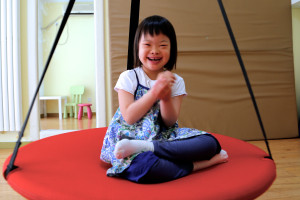Since 2012 World Down Syndrome Day has been observed annually on March 21st to raise awareness for one of the most common genetic conditions, affecting roughly one in every 1000 babies born per year. Abnormal cell division causing either a partial or full copy of chromosome 21 results in a wide range of developmental and intellectual delays as well as the characteristic facial features associated with Down syndrome.
Physical symptoms encountered with Down syndrome include low muscle tone, ligamentous laxity, short arms and legs, and decreased strength. These symptoms typically result in delayed achievement of developmental milestones including learning to sit, crawl, and walk. To acquire these basic movement skills children with Down syndrome have to overcome greater challenges than typically developing children. Particularly the symptoms of low muscle tone and ligamentous laxity impede with the development of early movement patterns, which normally occur in a predictable sequence. There is an increased risk for the development of abnormal compensatory movement patterns which can lead to functional and orthopedic problems if not addressed accordingly. A primary example is learning to walk. Children with Down syndrome typically adopt a walking pattern whereby they keep their feet wide apart, turned outward and their knees locked. This walking pattern provides more stability in the presence of low muscle tone and lax ligaments, however uses more energy and eventually may result in painful knees and feet. Physical therapists play an important role in the care of children with Down syndrome to minimize the development of such abnormal movement patterns and support optimal gross motor development.
Once children with Down syndrome have mastered walking, physical therapy continues to support gross motor development to maximize independence and participation with age-appropriate activities of daily living. In the presence of low muscle tone simple everyday tasks such as sitting and standing for periods of time can to quickly result in fatigue. In addition reduced balance skills and postural control, which are often associated with low muscle tone, can have a significant impact on other domains such as play- and self-care skills as well as functional skills required in the school setting. Regular physical therapy can help address such areas of weakness. Alternatively blocks of intensive therapy at developmentally critical periods might be appropriate to address impairments that are impacting the acquisition of new functional skills.
Despite achieving developmental milestones late, children with Down syndrome will mostly learn the same movement skills as typically developing children, just in their own time. A common misconception is that physical therapy for children with Down syndrome is targeted at speeding up gross motor development. Rather than speeding up development, physical therapy focuses on facilitating the appropriate sequence of milestones and the quality of the acquired movement skills while limiting compensatory movement strategies. Physical therapists support the motor development of children with Down syndrome from a very young age, including advocating for regular activity and healthy lifestyle habits. Due to high obesity rates among children with Down syndrome, often stemming from low physical activity levels and compounded by a physiological predisposition, it is important that healthy lifestyle habits are implemented from a young age to maximize health and quality of life in adulthood.
LIH Olivia’s Place has been providing therapy services for children with Down syndrome since the very beginning. Our company was originally founded to sure that Olivia Chow, a now 8-year-old girl with Down syndrome, as well as other children in China, received the care and support she needed. For more information, contact LIH Olivia’s Place at contactoliviasplace.lih.pub or (010) 6461-6283 (Beijing) (8621) 5404-0058 (Shanghai).





